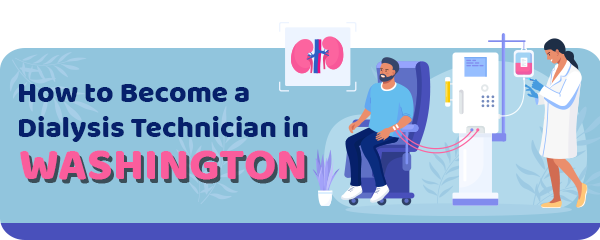Without dialysis machines and skilled operators, the lives of many individuals would be significantly shortened.
This underscores the critical role of dialysis technicians in the healthcare field.
While working with dialysis machines may not seem glamorous, it is a fulfilling profession for those dedicated to assisting others.
If you’re interested in learning more about this career, you’ve come to the right place. Keep reading!
Article Table of Contents
Dialysis Technician Job Description in Washington
Selecting a profession without a clear understanding of its responsibilities is not advisable.
Dialysis technicians in Washington play a pivotal role in caring for patients with kidney problems.
Their primary duty is to ensure the proper functioning of dialysis machines and to operate them in accordance with each patient’s specific needs.
This involves several other key responsibilities:
- Monitoring the vital signs of patients
- Assisting patients throughout the dialysis procedure
- Ensuring the safety and comfort of patients
- Reviewing patients’ medical history to identify potential concerns during the procedure
- Adjusting dialysis machines to suit individual patient needs
- Administering oxygen when necessary
- Basic Cardiopulmonary Resuscitation (CPR) if required
These represent the core responsibilities of a dialysis technician.
It’s important to note that these duties can vary day by day.
Dialysis Technician Requirements in Washington
Washington does not impose rigid training and certification requirements on dialysis technicians.
Instead, these professionals must adhere to the guidelines established by the Centers for Medicare and Medicaid Services (CMS).
The CMS outlines the prerequisites for future dialysis technicians, which encompass:
- High school diploma or GED
- Training
- Credentialing
- Competency Standards of Practice
- Licensure or certification
- Gaining work experience
It’s essential to obtain certification within 18 months of commencing employment.
Candidates can pursue various nationally recognized certifications through examinations such as:
- The Nephrology Nursing Certification Commission (NNCC).
- Certified Clinical Hemodialysis Technician (CCHT) Exam.
- The Board of Nephrology Examiners Nursing and Technology (BONENT).
- Certified Hemodialysis Technician (CHT) Exam.
- The National Nephrology Certification Organization, Inc. (NNCO).
- Certified in Clinical Nephrology Technology (CCNT) Exam.
- Certified in Biomedical Nephrology Technology (CBNT) Exam.
While Washington provides few specific regulations for this occupation, you will need to take written and practical tests.
Dialysis Technician Training Schools in Washington
Aspiring dialysis technicians in Washington need to complete a formal training program before seeking employment.
The first step is obtaining a high school diploma or GED.
In high school, it’s beneficial to focus on relevant subjects like biology, chemistry, medical terminology, anatomy, and physiology.
The actual training for dialysis technicians occurs in post-secondary educational institutions such as vocational schools, community colleges, or technical institutes.
These programs delve into topics like:
- Principles of dialysis
- Care of patients with kidney failure
- Possible complications of dialysis
- Water treatment and dialysate preparation
- Infection control
- Safety Dialyzer reprocessing
Typically, it takes around a year to complete a suitable training program.
Approved institutions offering these courses can be found in Washington.
Calhoun Community College 
Calhoun Community College provides a comprehensive 50-hour training program.
The course has two distinct completion options:
- Online Learning
- Classroom Instruction
The online option, priced at $1,299, covers tuition and includes e-books.
Students opting for this format should aim to complete the program within six months.
On the other hand, the classroom alternative, costing $999, also encompasses textbooks and conducts classes on Mondays and Wednesdays, commencing at 6 p.m.
It’s important to note that refund policies are applicable exclusively to in-person classes.
Auburn University 
Auburn University offers a fully online dialysis technician program at a tuition fee of $3,000.
This fee encompasses a comprehensive package, including:
- Interactive learning modules,
- Various learning exercises,
- Access to career resources,
- Round-the-clock mentoring support,
- Opportunities for national and state certifications,
- Self-paced learning.
Students enrolled in this program are expected to complete their coursework within a period of up to six months.
Alabama State University 
Alabama State University extends an online training program to prepare students for the exam administered by the Board of Nephrology Examiners Nursing and Technology (BONENT).
This program is open to students from various states; however, they should verify its alignment with their specific state regulations.
The tuition fee for the program amounts to $4,190 and is payable in installments.
The program spans 205 hours of coursework, which students can complete within a year.
Additionally, the program incorporates CPR training and certification, provided by the Red Cross.
Course content covers a wide array of subjects, including but not limited to:
- The Cardiovascular System
- The Urinary System
- The Endocrine System
- The Reproductive System
- Infection Control
- Principles of Hemodialysis
| School Name | Address |
|---|---|
| Calhoun Community College | online |
| Alabama State University | online |
| Auburn University | online |
Dialysis Technician Salary in Washington
Before embarking on any career path, it’s important to understand the potential income.
Dialysis technicians typically hold an entry-level position and can expect to earn an approximate annual salary of $54,800 in Washington.
For information on which areas within Washington offer higher salaries for dialysis technicians, refer to the table below.
Annual Salary Range:| Location | Avg. Annual Salary |
|---|---|
| Sammamish | $56,200 |
| Allyn | $55,000 |
| Sultan | $55,300 |
| Stanwood | $55,200 |
| Waitsburg | $53,800 |
| Yelm | $53,600 |
| Washtucna | $53,600 |
| Vancouver | $53,100 |
| Yacolt | $52,700 |
| Aberdeen | $52,700 |
Regional Salary in Washington
| Region | Employed | Avg. Annual Salary | Avg. Hourly Pay | Top 10% Annual Salary | Bottom 10% Annual Salary |
|---|---|---|---|---|---|
| Bellingham, WA | 150 | $65,610 | $31.54 | $92,860 | $39,830 |
| Bremerton-Silverdale-Port Orchard, WA | 130 | $88,690 | $42.64 | $158,150 | $44,350 |
| Kennewick-Richland, WA | 250 | $64,710 | $31.11 | $95,700 | $40,510 |
| Longview-Kelso, WA | 80 | $69,730 | $33.53 | $114,310 | $43,750 |
| Mount Vernon-Anacortes, WA | 110 | $72,070 | $34.65 | $102,680 | $46,910 |
| Olympia-Lacey-Tumwater, WA | 230 | $66,120 | $31.79 | $103,790 | $40,480 |
| Seattle-Tacoma-Bellevue, WA | 4,760 | $76,390 | $36.72 | $108,690 | $47,490 |
| Spokane-Spokane Valley, WA | 810 | $66,400 | $31.92 | $100,920 | $39,480 |
| Walla Walla, WA | 70 | $73,740 | $35.45 | $109,180 | $40,950 |
| Yakima, WA | 90 | $66,670 | $32.05 | $99,560 | $38,680 |
* Employment conditions in your area may vary.
Frequently Asked Questions
Where Does a Dialysis Technician in Washington Find Work?
There are many different settings where a dialysis technician can find employment.
The following locations are the most common:
- Hospitals
- Dialysis centers
- Outpatient clinics
- Home healthcare agencies
Which Other Skills Are Required for a Dialysis Technician in Washington?
Dialysis techs must possess a series of skills and abilities.
These include:
- Attention to details
- Excellent communication
- Empathy
- Patience
- Compassion
- Technical mind
Do I need a license or a certification to work as a dialysis technician in Washington?
In Washington, individuals only need a certification recognized at the national level if they want to work as dialysis technicians.
Read the full guide: How to Become a Dialysis Technician



